| | | | | | | Presented By Equinor | | | | Axios World | | By Dave Lawler ·Oct 21, 2021 | | Welcome back to Axios World. - We're starting tonight's edition (1,810 words, 7 minutes) with a look at sanctions.
New arrival? Subscribe | | | | | | 1 big thing: Making sanctions work | 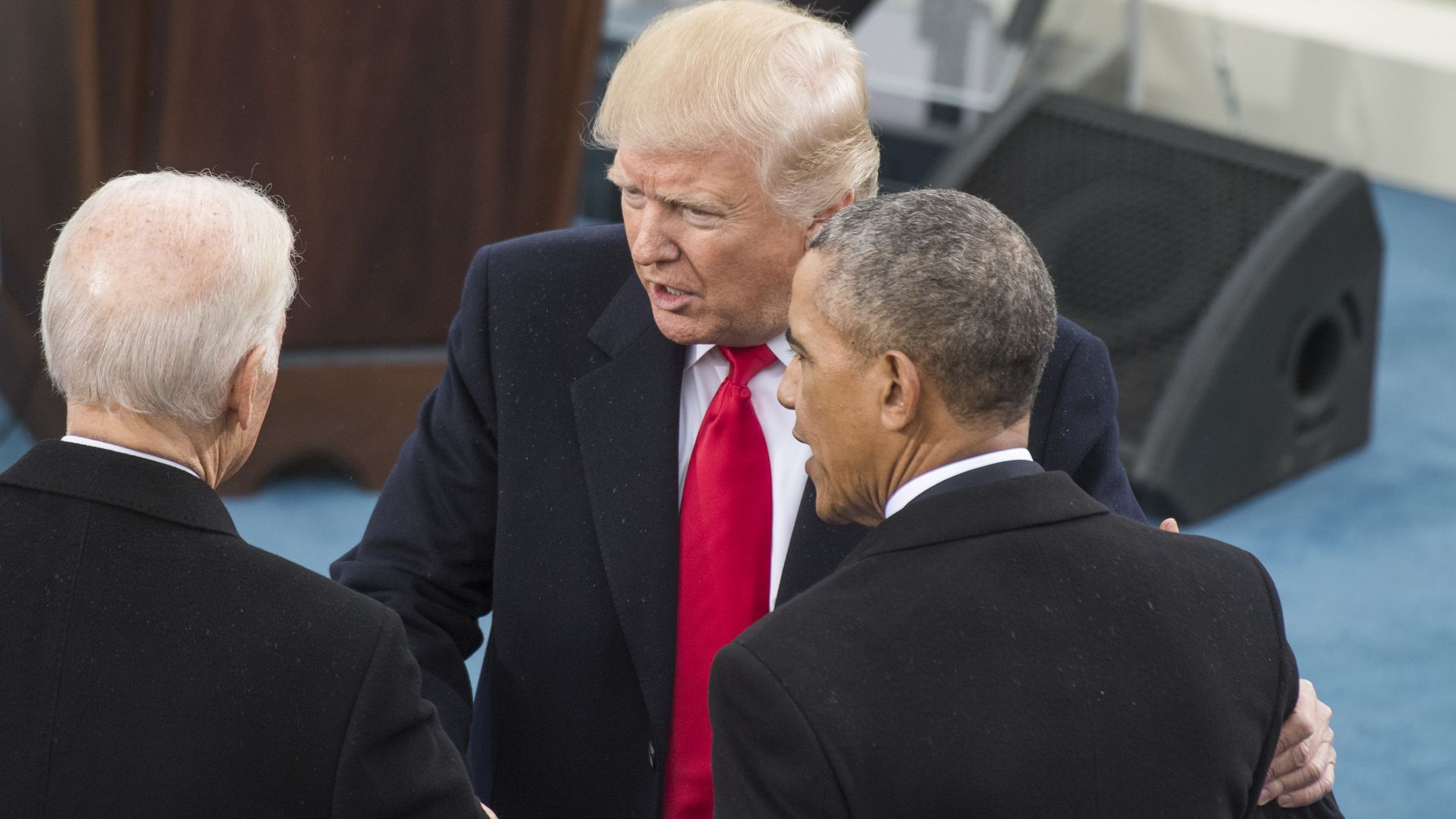 | | | Sanctions increased under Obama and dramatically under Trump. Photo: Tom Williams/CQ Roll Call | | | | The Biden administration is rethinking the U.S. approach to sanctions after four years of Donald Trump imposing and escalating them. The big picture: Sanctions are among the most powerful tools the U.S. has to influence its adversaries' behavior without using force. But they frequently fail to bring down regimes or moderate their behavior, and they can increase the suffering of civilians and resentment of the U.S. - A new Treasury report finds that sanctions designations have increased 933% since 2000, spiking particularly dramatically under Trump.
- Experts worry overuse of sanctions will ultimately weaken the tool as countries and businesses find new workarounds.
Driving the news: The Treasury's review determined that sanctions must be calibrated more carefully to limit their humanitarian costs and coordinated more closely with allies to maximize effectiveness. - It also emphasized that sanctions must be tied to specific policy objectives and circumstances under which they'd be lifted.
What they're saying: "Sanctions are a tool, they're not the end in themselves. If the tools are not used in service of a broader diplomatic approach, you may well inflict pain but you won't achieve your goal," former Treasury Secretary Jack Lew said today, speaking on a panel alongside Deputy Treasury Secretary Adewale Adeyemo, who led the policy review. - Lew bemoaned the fact that imposing sanctions is often framed as "tough" and lifting them (or even including humanitarian carveouts) as "weak" — the kind of outlook that results in failed policies remaining in place, and potentially in sanctions hurting civilians more than regimes.
- Worth noting: Biden has been much less inclined to impose new sanctions than his predecessor, but he seems in no rush to lift long-standing sanctions on Cuba.
Sanctions are too often imposed out of an impulse to "do something" in response to some malign activity, Daniel Fried, who served as sanctions coordinator during the Obama administration, tells Axios. - Such circumstances may call for sanctions on individuals in and around a regime, rather than whole industries and economies, he says.
- Fried argues that sanctions succeeded in getting Iran to the nuclear negotiating table, but that the Trump administration's subsequent "maximum pressure" approach was more "symbolic punishment" than policy tool.
Breaking it down: "It is not the objective of sanctions to deny sick people medicine and hungry people food. It is the goal of sanctions to cut off resources to create general economic pain," Lew said. "One is a byproduct of the other." - That's a rare acknowledgment of an uncomfortable truth: Whatever their effectiveness in the longer term, U.S. sanctions often hurt innocent people here and now.
Zoom in: One country the Biden administration has targeted for new sectoral sanctions is Belarus, where dictator Aleksandr Lukashenko rigged an election last year and violently suppressed the ensuing protests. - Opposition leader Sviatlana Tsikhanouskaya lobbied for those sanctions, arguing that they were the strongest available tool to pressure Lukashenko, but also conceding to Axios that they would hurt Belarusian civilians and may not bring down the regime.
The bottom line: The Biden administration wants to apply those sort of moral, strategic and geopolitical calculuses to its sanctions policies. That doesn't mean there will be easy answers. |     | | | | | | 2. Big sanctions problem: It's too easy to hide money |  | | | Nice house, Oleg. Photo: Vladislav Pavlov\TASS via Getty | | | | Russian aluminum oligarch Oleg Deripaska has been sanctioned by the Treasury Department since April 2018, restricting him from doing business or owning property in the U.S., Axios' Zach Basu writes. - On Tuesday, FBI agents raided properties in New York and D.C. owned by opaque limited-liability companies with ties to Deripaska, including a sprawling Embassy Row mansion located just miles from the White House.
Why it matters: The raid illustrates in plain sight how kleptocracy can undermine the effectiveness of sanctions — a problem that applies not just to individual actors, but to regimes like those in Iran and Venezuela that have shrugged off "maximum pressure" campaigns designed to cripple them. - And yet Treasury's long-awaited sanctions review made no mention of the loopholes and shell companies that dot the global financial system, allowing corrupt actors to hide their plundered wealth while civilians bear the brunt of the economic pain.
- "If you want to talk about why sanctions are ineffective or have problems, don't use sanctions less," says Paul Massaro, senior policy adviser to the anti-corruption Helsinki Commission. "Rather, look at the financial opacity, look at the anonymity provided by various tools in our system — and fix those."
What to watch: Revelations about offshore riches in this month's Pandora Papers have reinvigorated a bipartisan push to strengthen sanctions by countering the flow of dirty money enabled by the U.S. financial system. |     | | | | | | 3. Europe: Merkel seeks to soothe one last family feud | 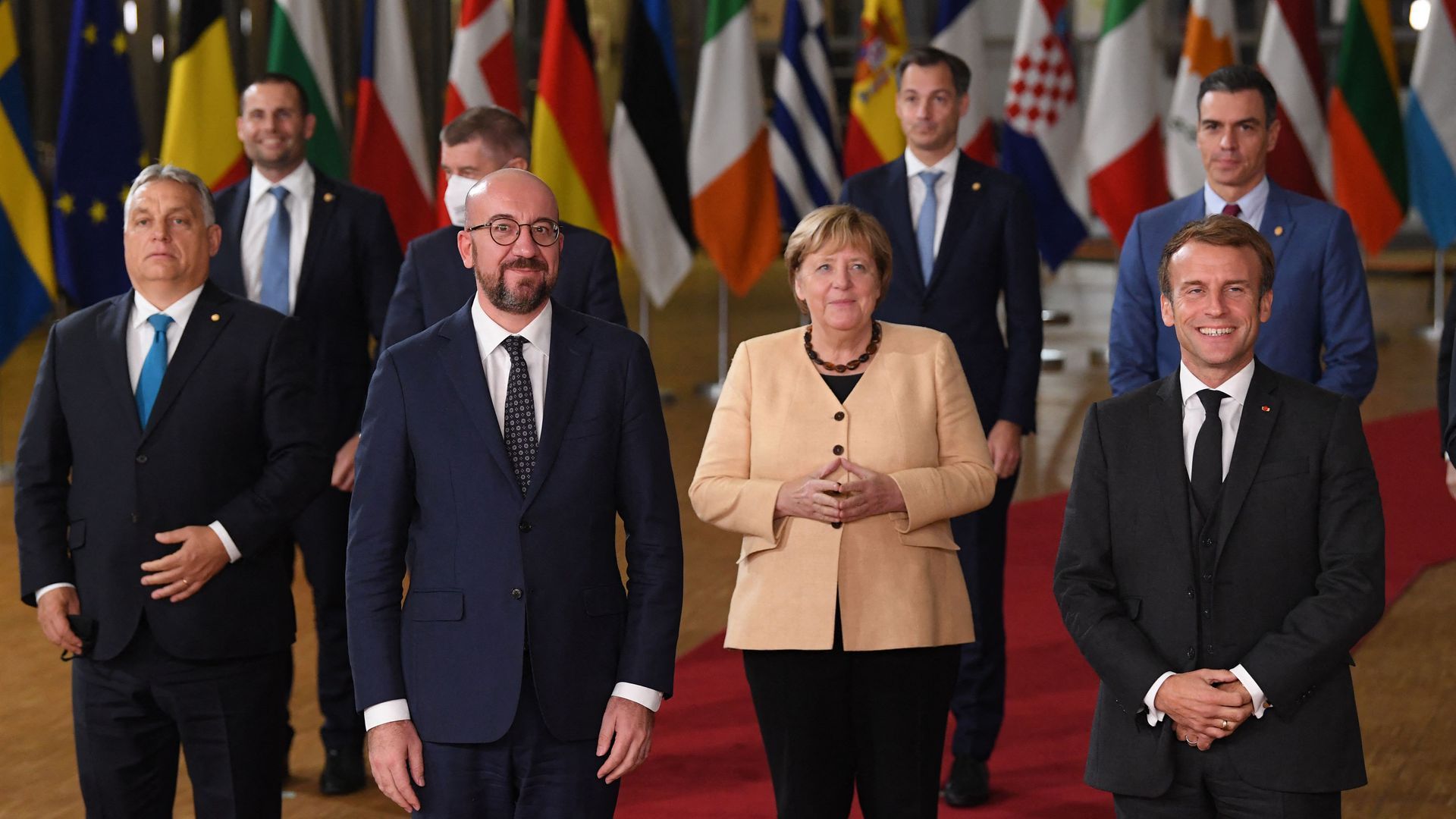 | | | A big happy family. Photo: John Thys/AFP via Getty Images | | | | Angela Merkel took up her vaunted mantle as Europe's crisis manager for what could be the last time tonight, as she urged the EU to find compromise in its showdown with Poland, Zach writes. Why it matters: The European Commission has threatened to withhold over $40 billion in pandemic recovery funds after Poland's constitutional tribunal — stacked with loyalists from the ruling right-wing populist party — rejected the principle that EU law has primacy over national law. What they're saying: European Parliament President David Sassoli accused Poland of undermining the "legal bedrock" of the EU, claiming that "never before has the Union been called into question so radically." - "Poland will not be intimidated," Prime Minister Mateusz Morawiecki shot back, accusing the EU of "financial blackmail" while insisting that his country had no intention of leaving the bloc.
- He received backing from Hungarian Prime Minister Viktor Orbán, who remarked as he arrived at the leaders' summit in Brussels that Poland was "the best country in Europe" and the victim of a "witch hunt."
Behind the scenes: EU officials did not take detailed notes on the Poland discussions at tonight's late-night summit and will not mention the issue in their formal conclusions, as leaders seem intent to keep any heated confrontations in "the family," according to Politico Europe. - Flashback: At the last summit in June, Dutch Prime Minister Mark Rutte told Orbán during a tear-filled debate that Hungary should leave the EU over its controversial anti-LGBT law.
What's next: Now at her 107th and potentially final leaders' summit, Merkel is seeking to minimize drama and the risk of losing a second EU member state as she exits the chancellery after 16 crisis-filled years: - "We must find ways and possibilities to come together again on this," she stressed, warning against a rush to sanctions or litigation.
|     | | | | | | A message from Equinor | | How Equinor is becoming a leader in America's offshore wind industry | | |  | | | | Equinor plans to power 2,000,000 homes in New York with homegrown, renewable energy — that will also boost the economy and generate jobs. With a net-zero target for 2050, Equinor is pursuing the development of the Empire Wind and Beacon Wind offshore wind projects in the U.S. | | | | | | Bonus: Where in the world |  | | | Screengrab via Apple Maps | | | | Today we're visiting a city with a mid-sized population but a massive cultural contribution. Can you name it? Scroll to the bottom for the answer. |     | | | | | | 4. Global news roundup | | 1. Big developing nations are refusing to commit to net-zero emissions by 2050, dampening hopes for a successful COP26 climate summit, Axios' Andrew Freedman reports. - China, India, Indonesia and other signatories say industrialized countries need to rapidly decarbonize by 2030 while giving other nations the opportunity to pursue emissions cuts over the longer term.
- Meanwhile, rich countries like Saudi Arabia, Japan and Australia are seeking to edit a UN report to downplay the need to rapidly move on from fossil fuels, according to leaks seen by the BBC.
- Go deeper: What to know about COP26 in Glasgow
2. Russian President Vladimir Putin on Wednesday supported a proposal for workers to stay home for a week to curb record-high coronavirus deaths. - Meanwhile, the Brazilian Senate's inquiry into President Jair Bolsonaro's handling of the pandemic found that he should be charged with crimes against humanity.
- In happier news, India has crossed 1 billion vaccinations.
3. Pro-democracy protests have swelled in Eswatini, and the government has responded with force and by shutting off the internet in the small southern African kingdom. 4. Gallup finds that approval of United States leadership in 46 countries and territories hit 49% — up from 30% at the end of Donald Trump's presidency, and matching former President Obama's first year (2009). - Ratings improved the most among European allies like Portugal (+52%) and Norway (+42%), and decreased in just three countries: Russia, Serbia and Benin.
|     | | | | | | 5. Scoop: Secret talks in Paris on spyware crisis | 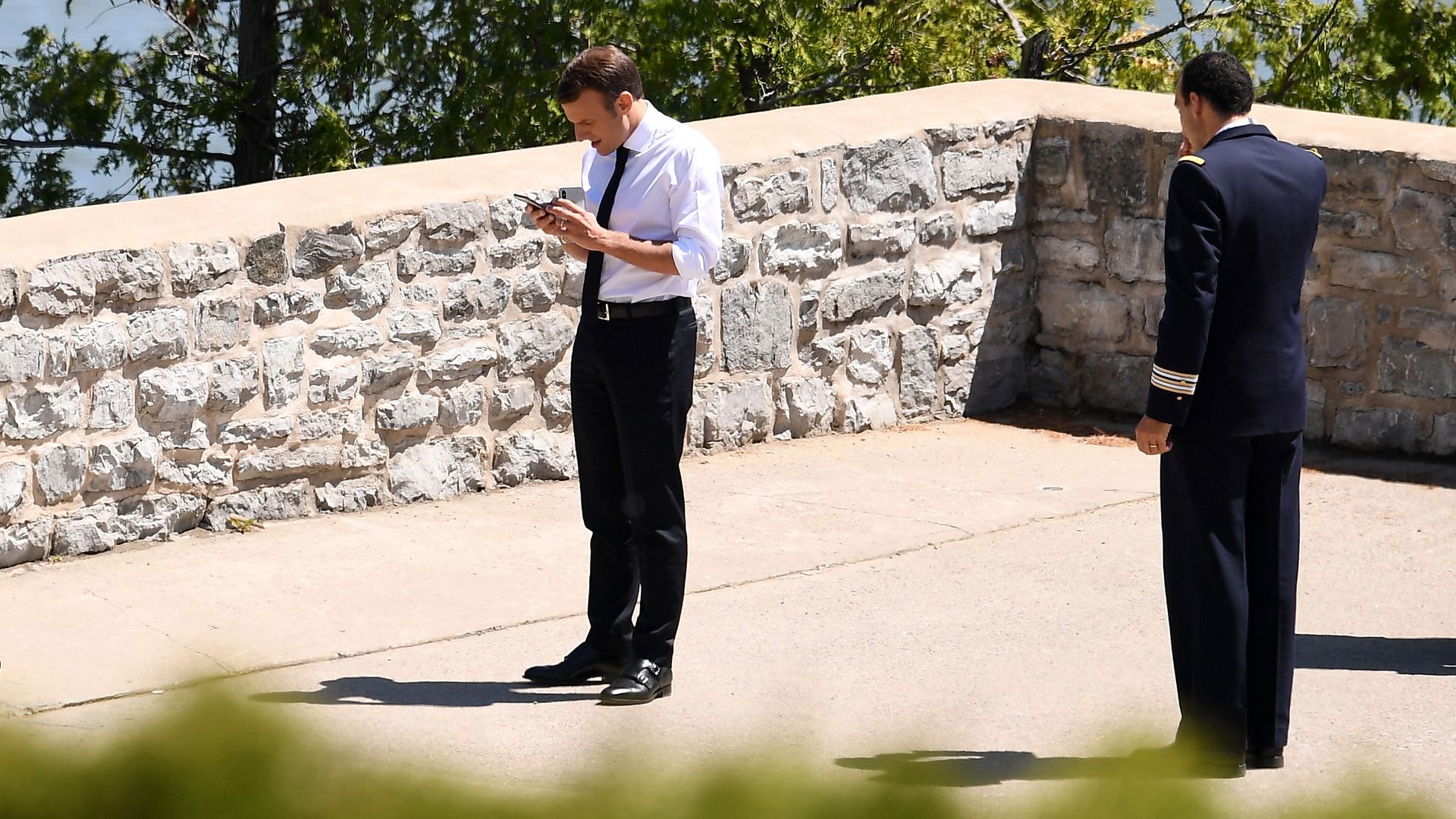 | | | Anyone listening? Photo: Leon Neal/Getty Images | | | | Israeli national security adviser Eyal Hulata secretly visited Paris several days ago for talks aimed at ending the crisis around the alleged use of Pegasus spyware developed by Israeli firm NSO to hack the cellphones of President Emmanuel Macron and other top French officials, Israeli officials tell Axios' Barak Ravid. Why it matters: An international consortium of investigative journalists reported in July that Pegasus — designed to track terrorists and criminals — had become a valuable tool for governments to spy on journalists and critics. - Among the countries listed in the reports as NSO clients are Hungary, India, Mexico, Morocco and Saudi Arabia.
- Some of the most explosive media reports at the time involved Morocco's alleged use of Pegasus to hack the phones of Macron and other French officials.
Driving the news: Hulata met in Paris with Macron's national security adviser, Emmanuel Bonne, briefed him on the ongoing Israeli investigation into Pegasus, and presented him with a proposal to end the crisis. - The Israeli proposal included a commitment to ban the hacking of French mobile phone numbers in any future spyware deal between an Israeli firm and a third country.
- A similar ban already exists on hacking U.S. and U.K. numbers.
More from Barak... Israel to approve construction in West Bank settlements Subscribe to Barak's Axios from Tel Aviv weekly newsletter. |     | | | | | | 6. China turns off the Celtics |  | | | Celtics center Enes Kanter. Photo: Jim Michaud/MediaNews Group/Boston Herald via Getty Images | | | | China will no longer stream Boston Celtics games after center Enes Kanter called Chinese President Xi Jinping a "brutal dictator" in a social media post backing independence for Tibet, Axios' Jacob Knutson writes. Why it matters: Kanter's criticism of Beijing has sparked another round of trouble for the NBA in China, one of its largest and most restrictive markets. Flashback: The league became embroiled in a geopolitical crisis roughly two years ago when Daryl Morey, the Houston Rockets GM at the time, tweeted — then quickly deleted — his support for pro-democracy protests occurring in Hong Kong. - The Chinese government and several Chinese businesses swiftly severed ties with the Rockets, even after both Morey and the NBA backtracked.
- The NBA was heavily criticized for not backing the pro-democracy movement in Hong Kong and for not condemning the CCP's human rights abuses.
Kanter, who faces arrest warrants in his native Turkey tied to his criticism of President Recep Tayyip Erdoğan, has routinely used his platform to advocate for human rights. Go deeper: Soccer stars speak out on China's Uyghurs — and pay a price |     | | | | | | 7. Stories we're watching |  | | | Sikhs take part in a procession at the Golden Temple in Amritsar, India. Photo: Narinder Nanu/AFP via Getty | | | - Polio vaccine drive in Afghanistan
- Latin America debates the right to die
- Jake Sullivan discussed Saudi-Israel normalization with MBS
- Housing slowdown threatens China's economic muscle
- Research that's not in English goes unread, leaving big blindspots
- Africa's glaciers to disappear by 2040s
- Biden's ambassador nominee: "China is not an Olympian power"
Quoted: "Phrases like 'the need for urgent and accelerated mitigation actions at all scales' ... should be eliminated from the report." — A proposed change to a UN climate report from an adviser to the Saudi Oil Ministry, per a leaked document seen by the BBC |     | | | | | | A message from Equinor | | The energy transition is the defining opportunity of our time | | | 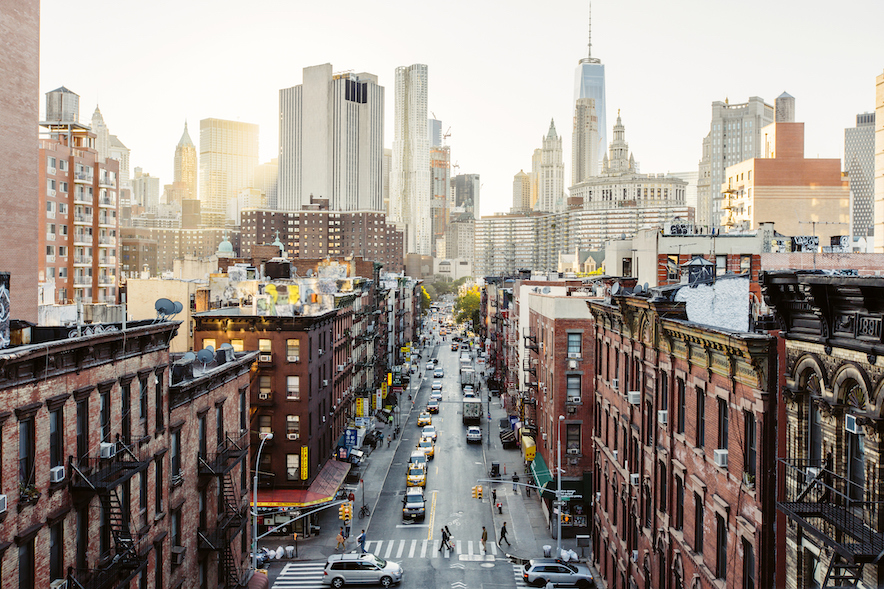 | | | | Equinor is accelerating the energy transition by growing our renewable energy portfolio and cutting greenhouse gas emissions. Through the Empire wind and Beacon Wind offshore wind developments we're planning to power 2,000,000 homes in New York with renewable energy. | | | | Answer: Florence, Italy |  | | It'll help you deliver employee communications more effectively. | | | | | | Axios thanks our partners for supporting our newsletters. If you're interested in advertising, learn more here.
Sponsorship has no influence on editorial content. Axios, 3100 Clarendon Blvd, Suite 1300, Arlington VA 22201 | | | You received this email because you signed up for newsletters from Axios.
Change your preferences or unsubscribe here. | | | Was this email forwarded to you?
Sign up now to get Axios in your inbox. | | | | Follow Axios on social media:    | | | | | |








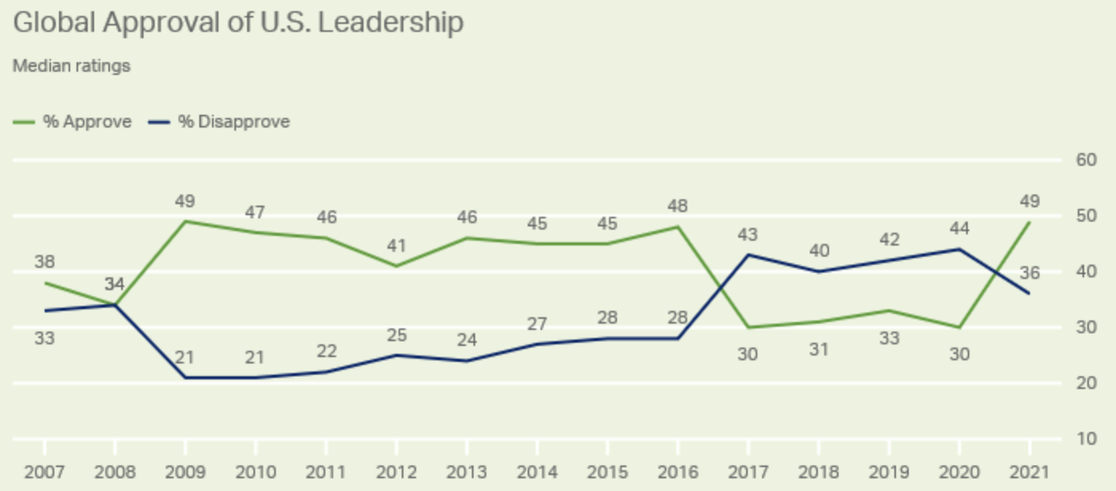




No comments:
Post a Comment